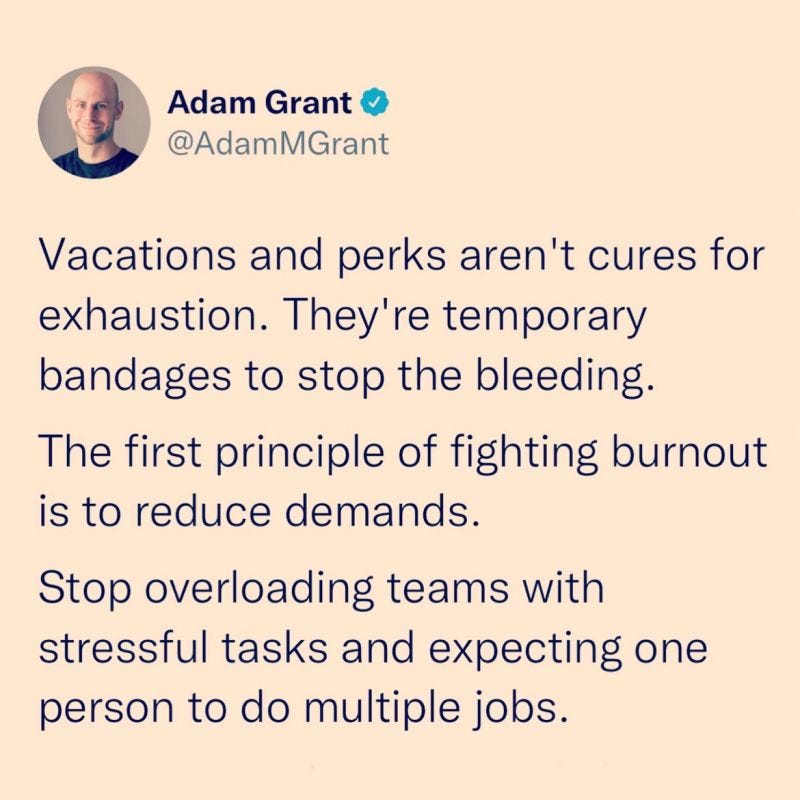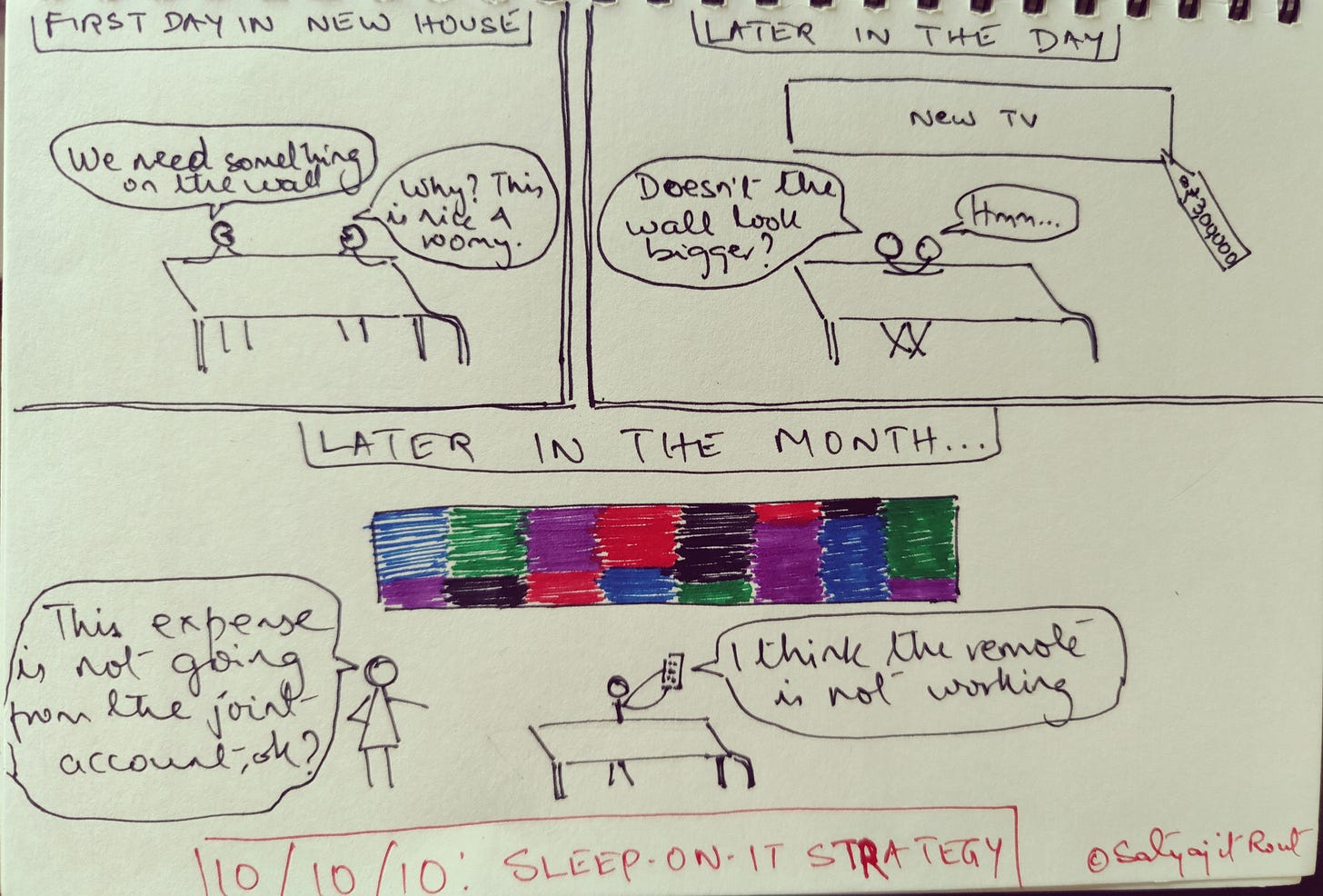#46 - Counting the zeroes, not just the ones
Plus how to manage emotions in decision-making
Hi friends! 👋👋
Welcome to Issue #46 of Curiosity > Certainty! It keeps slipping my mind to number the issue in the title itself so now I’ve this odd set of titles, some numbered, some not. I promise to do better.
This issue has some spiky world views thrown in. You should be counting the zeroes not the ones. Be it in the meetings you’re not invited to or the data you don’t see. Remember that the world’s busy counting the ones but if you can count the zeroes as well, you’ve an advantage over most others.
So let’s jump right in.
Being a Groucho Marx about meetings
You pay too much attention to the meetings you’re invited to and too little to the ones you’re not. The meetings you’re invited to are the ones where the collective feels they will be wiser for your presence. That’s why they want you with them. But the ones that you’re not invited to, or at least marked as an optional attendee, are the ones where the group feels wiser without you. Because you bring down the average. Because you are the free rider in that group.
As much as it hurts to think that, those are the very meetings that hold the most value for you. Think about it: you are not wanted because you aren’t smart enough. Which is exactly why you need to be a part of it. To get smarter.
Perhaps this is what Groucho Marx meant when he said, ‘I don’t care to join any club that will have me as its member.’ Any group, any club, any team that clearly wants you is getting more out of you than you’re out of them. The transaction is inherently asymmetric. You can’t do anything about it. But ioining the group will also make you feel welcome and warm and fuzzy. Those are all good feelings even though the needle of your knowledge won’t move.
So: if you want to learn, if self-improvement is your goal, get yourself in rooms where you’re the dumbest. Where you’re the free rider. That is where there’s most for you to gain. You’ll say how will anything work if everyone thinks like this? If everyone places their self-interest above everything else? Every interaction becomes a careful calculation. Fair point.
But let me point to the countless opportunities everyday where you make decisions where no one benefits but your ego. You consistently make choices in favor of situations where you feel good. You choose to do things you’re already good at because that makes you feel competent. You choose to join clubs where your presence is valued. You choose to hang with people among whom you’re the smartest.
Ask yourself: In such groups, clubs, rooms, what’s pushing me to be better?
PS - Another memorable Marxism (Grouchism? 🤔): ‘Marriage is a wonderful institution, but who wants to live in an institution?’
Quantification fallacy and the practice of ignoring zeroes
👉Does Adam Grant only share motivational bytes or is it that his motivational bytes are the ones most re-shared by his audience, giving the appearance that he’s just sitting there typing out tweets he simply knows will get RTed and shared thousands of times over?
👉Do NPS scores reflect the true health of a business or product? And if they do, as most believe, shouldn’t the survey response rate be taken into account, assuming that any customer who opts out of the survey is likely to have rated lower than a 9 (Remember: a score below 9 means the customer is not a promoter) and hence would only have brought the score down? If you’ve ever given your car for servicing you may have been hounded by the customer service folks to rate them a 9 or 10.
👉Are comments the true indicator of the level of engagement with a piece of content or is there some context missing? A mentor of mine who had won a Substack fellowship shared an insightful nugget the other day. A co-fellow from the program with thousands of subscribers for his animation newsletter consistently received low numbers of comments. He tried optimizing his content until he realized (or found out) that his audience saw him as an expert and read his newsletter as an authoritative guide. Which leads to the theory that Educate Me content gets fewer comments than Entertain Me content, even when both resonate with the audience. So does that mean that the LinkedIn algorithm, for example, over-emphasizes comments as a sign of engagement just because it is easily measurable?
👉In reading control of play in football, one key metric is the difference in shots on target. But is it the absolute difference that matters or do the actual number of shots matter too? A 10-5 difference in shots on target may yet accompany a scoreline of 0-5 if all the opposition’s shots have gone in and none of yours have, but a 5-0 tally in attempted shots will guarantee that the opponents have not scored a single goal, and so you cannot lose. So if you’re reading both situations as same based only on the absolute difference in shots on target, you’re missing an important clue.
Quantification fallacy dictates that we rarely look beyond what we can measure. The spotlight shines over a set of numbers, so the clues must be hidden in them and nowhere else. What if we started looking for what is not visible? Look at what did not happen. Count the zeroes, instead of just the ones. One great book to learn about it is Tarzan Economics and a great article to dive into is this piece on online advertising.
What are some situations where you count the zeroes?
PS: This graphic is in Spanish but I have included it as inexplicably as the fervor with which we deify NPS scores.
Getting some distance between you and your big emotions
If you find yourself making rash decisions or agonizing over decisions, this is for you.
Moments of raw emotion may make you feel obligated that you need to decide that very instant 🤷♂️ And such moments come in all manner–from letting a bare wall tell you you need a bigger television to going back and forth on whether or not to propose to your partner of several years.
Finding you in the grip of such emotion, friends may advise you to ‘sleep on it’. Yet, sleep is scarce when faced with a tough choice. What you need is a ‘𝐬𝐥𝐞𝐞𝐩-𝐨𝐧-𝐢𝐭’ 𝐬𝐭𝐫𝐚𝐭𝐞𝐠𝐲. Thankfully, there’s one. It’s called 𝟏𝟎/𝟏𝟎/𝟏𝟎 and there’s a book on it by business writer Suzy Welch.
𝐓𝐡𝐞 𝐡𝐚𝐜𝐤 𝐢𝐧 𝐭𝐡𝐞 𝐬𝐭𝐫𝐚𝐭𝐞𝐠𝐲 𝐢𝐬 𝐭𝐨 𝐢𝐦𝐚𝐠𝐢𝐧𝐞 𝐲𝐨𝐮𝐫 𝐟𝐮𝐭𝐮𝐫𝐞 𝐞𝐦𝐨𝐭𝐢𝐨𝐧𝐚𝐥 𝐬𝐭𝐚𝐭𝐞𝐬 𝐛𝐞𝐟𝐨𝐫𝐞 𝐲𝐨𝐮 𝐝𝐞𝐜𝐢𝐝𝐞. When you’re experiencing regret, you see the what-might-have-beens 🤦♂️But what if you could consider consequences before the judgment and avoid any lapse 💡
Here’s a simple protocol to apply the 10/10/10 strategy.
👉Set a tripwire: This is to recognize the emotional trigger. A stinker that just landed in your inbox, a tempting offer on the phone, your best friend who just got married to the man of her dreams. There are situations when you’re likely to be impulsive. You don’t need a definition for such situations; just go with how you feel inside. Feeling sick, angry, overwhelmed are trusty red flags.
👉Take a timeout: Once the tripwire is activated, take a forced break as a rule. Don’t tell yourself you’re in control. You’re blind to your blindness. The timeout forces you to reflect.
👉Time-travel: This is the main part where you take help from future-you to make a decision that present-you is likely to be rash about. You can evaluate your options using the 10/10/10 system. Ask:
𝐖𝐡𝐚𝐭 𝐚𝐫𝐞 𝐭𝐡𝐞 𝐜𝐨𝐧𝐬𝐞𝐪𝐮𝐞𝐧𝐜𝐞𝐬 𝐨𝐟 𝐞𝐚𝐜𝐡 𝐨𝐟 𝐦𝐲 𝐨𝐩𝐭𝐢𝐨𝐧𝐬 𝐢𝐧 𝟏𝟎 𝐦𝐢𝐧𝐮𝐭𝐞𝐬? 𝐈𝐧 𝟏𝟎 𝐦𝐨𝐧𝐭𝐡𝐬? 𝐈𝐧 𝟏𝟎 𝐲𝐞𝐚𝐫𝐬?
You can go with the bigness of the decision to decide the time frame. It could even be 10 minutes, 10 hours, and 10 days if it’s cheating on your diet that’s up for debate.
If you don’t get a clear answer from the future-you, Annie Duke, author of Thinking in Bets, suggests a great addition to the practice. Talk to your past-you. Ask: ‘How would I feel now if I had made this decision 10 minutes ago? 10 months ago? 10 years ago?’
How do you manage your emotions when taking decisions? I would love to know about it.
Anticipating regret before it has happened may sound novel but is not. It is a (not so) simple matter of attaining distance before deciding. We do it every day, just not intentionally enough. Making a habit out of imagining regret can save us from going on guilt trips later by forcing us to reflect on the consequences of our actions ahead of time.
*****
That’s it for this week. Thanks for reading!
Tell me what you would want more of (or less of) from me. Spread some ❤ by sharing it with a friend or two.
Until next week…




